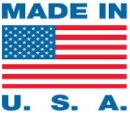Exploring the Fabrication and Applications of Custom Profile Extrusions
Created at : Aug 10, 2023
In the world of manufacturing, customization plays a pivotal role in meeting diverse industry requirements. One such versatile manufacturing process is custom profile extrusion, a technique that allows for the creation of intricate and tailored cross-sectional shapes from various materials. This article delves into the process of fabricating custom profile extrusions and highlights their wide-ranging applications across industries.
Understanding Custom Profile Extrusions
Custom profile extrusion is a manufacturing process that involves pushing a material, usually in the form of pellets, granules, or powders, through a specially designed die to form a desired shape. This die is a precision-engineered mold with an opening that matches the intended cross-sectional profile of the extrusion. The material is heated and pressurized, enabling it to flow through the die, and then cooled rapidly to solidify the newly formed shape. The resulting extrusion can be cut into desired lengths and further processed if needed.
Fabrication Process
- Material Selection: The choice of material is fundamental and is based on the end-use application. Commonly used materials include metals (aluminum, steel), polymers (PVC, ABS), and even advanced materials like composites.
- Die Design: Engineers create detailed designs for the extrusion die. The die's profile, dimensions, and other specifications are carefully considered to ensure the final product meets the desired requirements.
- Heating: The chosen material is heated to a molten state. The temperature varies depending on the material's characteristics, and it is crucial to achieve uniform melting to ensure consistent extrusion.
- Extrusion: The molten material is forced through the die using a ram or a screw mechanism. This exerts pressure on the material, causing it to take the shape of the die's cross-section.
- Cooling: Once the extrusion has passed through the die, it is rapidly cooled using various methods such as water baths or air cooling. This solidifies the material into its final shape.
- Cutting and Finishing: The extrusion is cut into desired lengths using saws or other cutting tools. Further finishing processes like machining, drilling, and surface treatments can be applied to achieve specific tolerances or surface qualities.
Applications of Custom Profile Extrusions
The versatility of custom profile extrusions makes them a preferred choice in various industries:
- Construction and Architecture: Custom aluminum extrusions find applications in windows, doors, curtain walls, and structural components due to their lightweight, corrosion-resistant, and aesthetically pleasing qualities.
- Automotive: Extruded profiles are used in automotive parts, from trim elements to structural components, benefiting from the material's strength, low weight, and design adaptability.
- Electronics: The electronics industry relies on extruded heat sinks, housings, and enclosures, as they provide efficient thermal management and electromagnetic shielding.
- Consumer Goods: Items such as furniture, sporting equipment, and household appliances often incorporate custom extrusions to enhance their functionality and appearance.
- Transportation: The aviation and rail industries utilize extruded profiles in the construction of aircraft interiors, train components, and lightweight panels.
- Renewable Energy: Solar panel frames and mounting systems are often made from custom aluminum extrusions, as they offer durability and lightweight support structures.
- Medical Sector: Custom extrusions are used in medical equipment and devices, taking advantage of their biocompatibility and ease of sterilization.
Conclusion
Custom profile extrusions have revolutionized modern manufacturing by enabling the creation of intricate and tailored cross-sectional shapes. Through a controlled fabrication process, materials are transformed into precise profiles that cater to a myriad of applications across industries. The adaptability, versatility, and material choices offered by custom profile extrusions continue to drive innovation and efficiency in various sectors, contributing to the advancement of technology and improving everyday products.

